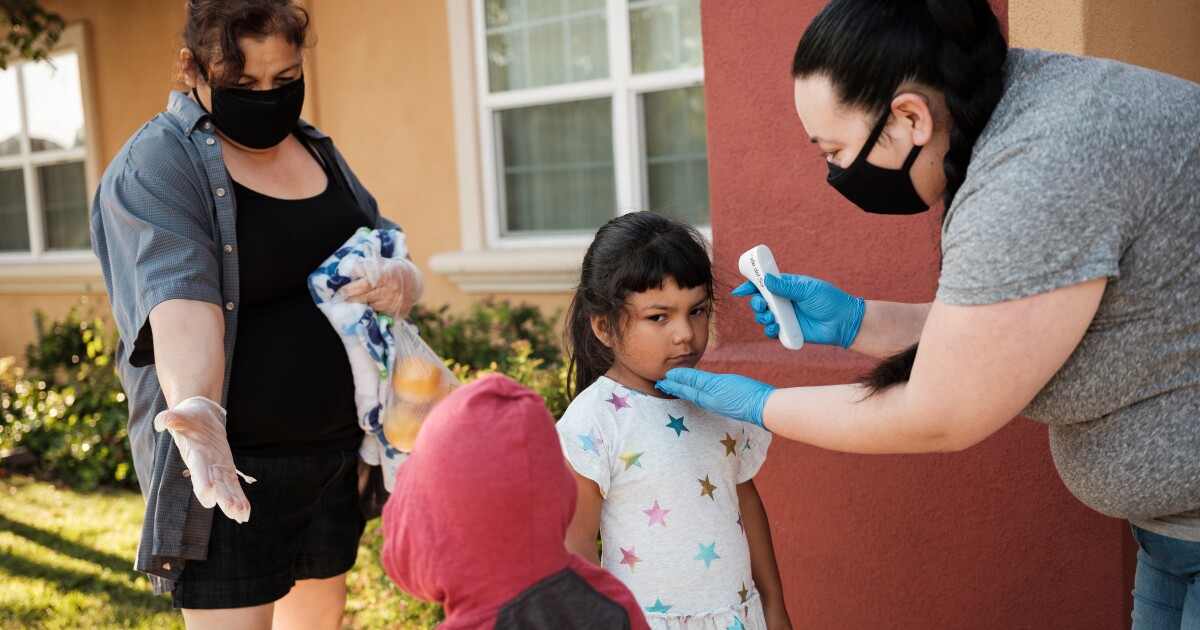Six-month-old infants and toddlers up to 5 years old can now be vaccinated against COVID 19, with two brands available and effective, according to the American Academy of Pediatrics (AAP) and the Centers for Disease Control and Prevention ( CDC).
There is no preference for the Moderna vaccine or the Pfizer BioNTech vaccine, but the new variants need parents to make informed decisions, said pediatrician Norma Perez of AltaMed Services, who dispels some of the questions parents have about this new vaccine access for minors.
“Vaccines only have a tiny fraction of the amount of bacteria and viruses that children are naturally exposed to. Because of this, your immune system has the ability to receive vaccines to produce immunity against diseases while also fighting off minor illnesses,” she said.
Is the COVID vaccine safe for infants six months and older?
Pfizer and Moderna show to be safe. The symptoms are the same that we have been seeing among children and adults; such as the typical inflammation where the vaccine occurs, redness, pain in the area, and other systemic systems such as fatigue or fever. Remember that the little ones cannot express their symptoms, but they can cry more, be more irritable, not have an appetite or not be able to sleep well, which should pass in a couple of days.
Is there a need to vaccinate children of these ages, even though it has been seen that they are at less risk?
With the different variants we have seen such as Delta and Omicron, it will be difficult to predict if the next variants may be more severe or light. Many people believe that as time passes the virus weakens and this is not the case, so if the minor is eligible it is important that they receive the vaccine, since health experts want to prevent hospitalizations, complications and the spread of COVID-19.
Which vaccine is the best for these ages?
The data shows that both vaccines are safe for children. The vaccine that requires 3 doses (Pfizer) was first tested with 2 doses. Adding the third dose was found to be more effective in protecting infants and young children from the omicron variant, which is the most widespread in the United States right now. The vaccine has a series of 3 doses. The Pfizer vaccine is for children ages 6 months to 4 years.
The vaccine that requires 2 doses (Modern) was tested with 2 doses. It was found to be safe and effective. Right now, Moderna is studying a third dose of its vaccine. The vaccine may also be converted into a 3-dose series. For these ages there is still no talk of reinforcements. La Moderna is for children from 6 months to 5 years.
What if my child has allergies?
If there are allergies to food, milk or nuts, the child can still be vaccinated. The only reason not to vaccinate them is a severe allergy to the compounds within the vaccine.
Should we take into account the possible autism fear of a vaccine?
This is not only a concern of this vaccine, but of all before many parents. But we’ve had hundreds of studies all over the world that have shown that there is no connection between vaccines and autism. These can be confusing times, but parents should fearlessly approach their children’s pediatricians to make informed decisions.
Even with the vaccine, can children be infected?
Yes. That is true for anyone, whether child or adult. However, the difference is that those who are vaccinated have an illness with minor symptoms and recover quickly, but those who are not vaccinated may have more severe illness, a higher risk of hospitalization and a higher risk of death. We cannot predict the next strains.
How long does the immunization last?
After six months, a decrease in antibodies has been seen, which is why we speak of reinforcing vaccines at the ages approved for now. However, there are no reinforcements even for children in this group from 6 months to 5 years.
My child is immunocompromised, can they receive an additional dose of the COVID-19 vaccine?
If your child received the Pfizer-BioNTech COVID-19 vaccine as their primary series, an additional dose of the primary series is not recommended if your child is immunocompromised. If your child received the Moderna COVID-19 vaccine as his or her primary series, he or she is eligible to receive a third primary dose administered at least 4 weeks after his or her second dose.
What is myocarditis and pericarditis? Should I be concerned about my child developing this after receiving the COVID-19 vaccine?
Myocarditis is inflammation of the heart muscle and pericarditis is inflammation of the outer lining of the heart. In both cases, the body’s immune system causes inflammation in response to an infection or other trigger. Symptoms may include chest pain, shortness of breath, or rapid heartbeat. After reviewing the available data on the known risks of COVID-19 disease and its related potentially serious complications, the CDC determined that the benefits outweigh the risk of myocarditis or pericarditis after receiving the COVID-19 mRNA vaccines for children.
Since the start of the pandemic, more than 13 million children have tested positive for COVID-19 in the United States, and nearly 1,600 children have died from the virus or from complications of multisystem inflammatory syndrome (MIS-C). ).
–


:quality(80)/cdn-kiosk-api.telegraaf.nl/c1a04c80-f880-11ec-b539-02d2fb1aa1d7.png?resize=150%2C150&ssl=1)